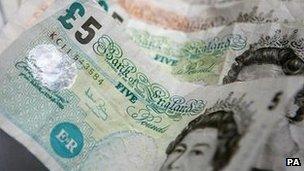Moody's credit rating cut 'shows UK economic policy failure'
- Published

Moody's said the UK government's debt reduction programme faced significant "challenges"
Scottish ministers have claimed that the loss of the UK's top AAA credit rating has confirmed the failure of the Westminster government's economic policy.
Finance Secretary John Swinney said the coalition's austerity drive had undermined the chances of growth.
But Treasury Chief Secretary Danny Alexander said the UK government must continue its economic recovery plan.
He argued that credit rating agencies were "not the be all and end all".
On Friday, Moody's became the first agency to cut the UK from its highest AAA rating to Aa1.
Moody's said the government's debt reduction programme faced significant "challenges" ahead.
Mr Swinney claimed the decision to downgrade the UK's rating confirmed the "utter failure" of the UK government's economic strategy.
Speaking on BBC Radio Scotland, Mr Swinney criticised Chancellor George Osborne for his approach to capital expenditure.
'Wrong on all counts'
He said: "We could have invested more in our capital estates rather than reducing capital budgets by now 26% - a quarter - and the consequence of that is to deliver very sluggish economic activity.
"The UK government has got it wrong on all counts and it now needs the chancellor to take action very swiftly in the budget to stimulate the economy and provide the platform for growth which they have failed to do since 2010."
Mr Swinney also argued that an independent Scotland would have a better approach to managing its economy.
The SNP claimed Scotland had stronger public finances than the rest of the UK, with the most recent GERS figures indicating that Scotland contributed 9.6% of public revenues but received 9.3% of public spending.
It also pointed out that the SNP government had balanced Scotland's budget in every year since 2007, while the oil and gas sector boosted the UK's balance of trade by £40bn.
But Mr Alexander argued that the financial future for an independent Scotland was a lot less secure than Mr Swinney suggested because the country had "no track record".
He continued: "I think an independent Scotland would be in a much more difficult situation in terms of raising finance, in terms of its debt and its borrowing."
Mr Alexander remained positive about Westminster's economic strategy, despite the credit rating cut.
'Disappointing news'
He said: "Of course this is disappointing news but I've always said the credit rating agencies are not the be all and end all.
"In the end what matters is having the right mix of policies to support the economy, to deal with the financial problems that we inherited and crucially to provide jobs in the British economy."
He added: "Because of what's going on around the world, because of what's happening in eurozone, progress has been slower than we would've hoped.
"But I've always said it's a long hard road that we're on but we have to stick to that path, we have to keep to that road because the alternative is much, much more difficult for this country."
'Wrong priorities'
Scottish Labour MP Cathy Jamieson claimed the rating downgrade was the latest sign that the economic policies of the coalition were not working.
"Scotland is stuck between two governments with the wrong priorities," she said.
"A Westminster government which has brought recession and stagnation instead of growth and a Scottish government which has failed to use the tools and policies at its disposal to protect Scotland from the cuts."
In announcing the rating cut, Moody's cited the "challenges that subdued medium-term growth prospects pose to the government's fiscal consolidation programme, which will now extend well into the next parliament".
It added that the UK's huge debts were unlikely to reverse until 2016.